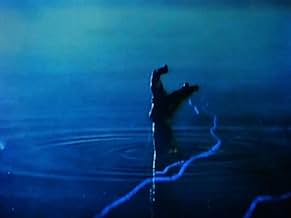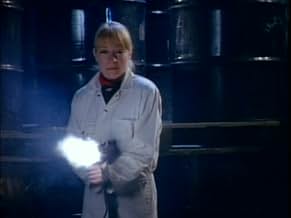IMDb RATING
6.5/10
1.6K
YOUR RATING
Humanity must resume its war against the Martians when they revive after decades of hibernation following their defeat in the 1950s.Humanity must resume its war against the Martians when they revive after decades of hibernation following their defeat in the 1950s.Humanity must resume its war against the Martians when they revive after decades of hibernation following their defeat in the 1950s.
- Awards
- 1 nomination total
Browse episodes
Featured reviews
The idea of bringing back the aliens from War of the Worlds is simply great, especially for those who wonder "what if the aliens had attacked us with our technology today, instead of back in the '50s?" The answer is clear; they would STILL kick ass! The heat rays they used are just as unbeatable in the 80s as they were in the 50s, and the idea of the aliens going into hibernation to survive rather than just dying was a great plot device to bring them into the present. The spaceships, sound effects and sfx are lovingly recreated in the series. The show reminds me of Star Trek, in one respect only - both shows had great premise, but given too little backing by the studios that created them. Networks will never learn - if you're going to do a risky new sci-fi series, either back it all the way or don't bother. If the series had been given full support with and heavy advertising, and maintained the intelligence of the stories, this might have gone on for years. As it is, it's definitely worth checking out on the sci-fi channel. Now if there is ever a War of the Worlds/Star Trek crossover, that would definitely be worth seeing...(no matter how silly the idea is.)
Eight stars for effort on this series.
Eight stars for effort on this series.
This is one of those series that I caught in second run, and had to see all of. Rather than being cliched and boring, War of the Worlds managed to be trendy and dark, attempting to deal with mature themes and violence in an intelligent fashion all too rare today.
Perhaps the best season was the second, when the war becomes a drawn-out war of attrition, culminating in one of the most thought-provoking finales I have seen this side of Babylon 5. It is currently airing on Space in Canada, and is definitely worth seeing if you can.
Perhaps the best season was the second, when the war becomes a drawn-out war of attrition, culminating in one of the most thought-provoking finales I have seen this side of Babylon 5. It is currently airing on Space in Canada, and is definitely worth seeing if you can.
War of the Worlds season one was my favorite television series. I was only nine when it came out, but I was amazed from the first episode. The characters were complex and very different from each other. The storyline kept me hooked wondering just who would win in the next episode. I was, however, very disappointed with season two. I couldn't really follow what had happened to make the series so different from the first and it was very dark. As for the first season, I haven't found a series on television since that has topped it. I remember it so well after 16 years and really want to see it again. I truly hope that it will be released on DVD someday. If you ever get the chance to see it, I know you'll really enjoy it.
The best thing about this series was that, in the first half of the first season, you never knew who was going to win the battles. An example plot would have the aliens trying to acquire a list of the locations of their canned (literally) comrades. The humans try to stop them but fail.
That's what I loved about the series: EVERYTHING was unexpected. Then late in the first season, you started having plots that were too obvious. (On TV in the 80s, there was no way aliens were going to detonate a nuclear bomb in the middle of the USA--especially with our heroes in the same city!) From that point on, the show settled for standard science fiction. It was still interesting, but it had lost its spark and never got it back.
That's what I loved about the series: EVERYTHING was unexpected. Then late in the first season, you started having plots that were too obvious. (On TV in the 80s, there was no way aliens were going to detonate a nuclear bomb in the middle of the USA--especially with our heroes in the same city!) From that point on, the show settled for standard science fiction. It was still interesting, but it had lost its spark and never got it back.
Very little is known of the alien invaders from Mortax and the series did not intend to explain much of them. In the original, "War of the Worlds", the aliens originate from Mars. Since Mars is a dead planet and presumably any presence of an indigenous civilization would be noticed from earth, it made sense to change the origin of the aliens to a faraway solar system.
It was a shame that the series did not capitalize on the episode, "Angel of Death". The unexpected, ironic, and somewhat twisted humorous ending would have made for a much more interesting second season had the original plot line been followed. As it was, some viewers, including myself, disliked the second season's post-apocalyptic setting and stopped watching the series.
I present here my own speculative analysis of the aliens from Mortax, for anyone curious enough to read on.
Most likely the inhabitants of Mortax originated from a tightly controlled, rigid, caste-driven society. The upper caste was smug in its superiority over the lower caste classes, even those presumably of a high class, such as scientists. The ruling caste or upper classes which ruled Mortax probably were probably a hereditary class which may or may not have included a military class as a subsidiary upper caste.
At some point in its history, the lower caste classes of Mortax gained political power enough not to overthrow the current ruling caste but enough to gain comparable political parity and most importantly, respect.
As a result of this paradigm shift in Mortax civilization, the upper ruling class now had to address the lower classes with respect. They now called the lower classes, 'comrades'. The lower classes could now address their heretofore upper caste rulers as, 'advocates', not, sir, ma'am, majesty, excellency, highness, lord, mistress, or any other such title conferring superiority over the claimant and inferiority over the one saying it. But it is very clear from the comments of the often frustrated Advocate triumvirate that the bigotry of the upper castes over the lower castes is still very much alive. But now it is politically incorrect to say so in front of them.
Mortax civilization was now unified and moreover, unified in its new, overriding goal, the salvation of its race, civilization, and culture. Unfortunately, the smug racial superiority and bigotry of the upper caste were now subsumed by all of Mortax society. The new inferior class fit only for extinction were the humans of earth. The invasion of earth is an invasion to humans. For Mortaxians, it is a 'colonisation' of a habitable planet regrettably infested with inferior biological sentients called humans whose existence is expendable. The invasion is a fight to the death for all of humanity.
It was a shame that the series did not capitalize on the episode, "Angel of Death". The unexpected, ironic, and somewhat twisted humorous ending would have made for a much more interesting second season had the original plot line been followed. As it was, some viewers, including myself, disliked the second season's post-apocalyptic setting and stopped watching the series.
I present here my own speculative analysis of the aliens from Mortax, for anyone curious enough to read on.
Most likely the inhabitants of Mortax originated from a tightly controlled, rigid, caste-driven society. The upper caste was smug in its superiority over the lower caste classes, even those presumably of a high class, such as scientists. The ruling caste or upper classes which ruled Mortax probably were probably a hereditary class which may or may not have included a military class as a subsidiary upper caste.
At some point in its history, the lower caste classes of Mortax gained political power enough not to overthrow the current ruling caste but enough to gain comparable political parity and most importantly, respect.
As a result of this paradigm shift in Mortax civilization, the upper ruling class now had to address the lower classes with respect. They now called the lower classes, 'comrades'. The lower classes could now address their heretofore upper caste rulers as, 'advocates', not, sir, ma'am, majesty, excellency, highness, lord, mistress, or any other such title conferring superiority over the claimant and inferiority over the one saying it. But it is very clear from the comments of the often frustrated Advocate triumvirate that the bigotry of the upper castes over the lower castes is still very much alive. But now it is politically incorrect to say so in front of them.
Mortax civilization was now unified and moreover, unified in its new, overriding goal, the salvation of its race, civilization, and culture. Unfortunately, the smug racial superiority and bigotry of the upper caste were now subsumed by all of Mortax society. The new inferior class fit only for extinction were the humans of earth. The invasion of earth is an invasion to humans. For Mortaxians, it is a 'colonisation' of a habitable planet regrettably infested with inferior biological sentients called humans whose existence is expendable. The invasion is a fight to the death for all of humanity.
Did you know
- TriviaOriginally, Paramount had conceived the series not as a sequel or for television, but a feature remake of The War of the Worlds (1953) with George A. Romero slated to direct.
- GoofsThroughout the entire first season, the aliens are preoccupied with finding their hibernating comrades, and only twice do they ever discuss getting a hold of the original warships from the 1953 invasion. However, Dr. Harrison Blackwood says in the pilot episode that there were thousands of ships warehoused by the military after the invasion, and it would only take the aliens getting a hold of one of them to wipe out humanity. It seems odd then that the aliens never make this a priority.
- Quotes
Harrison Blackwood: In 1953 Earth experienced a War of the Worlds. Common bacteria destroyed the aliens but it didn't kill them. The aliens fell into a state of deep hibernation. Now the aliens have been resurrected more terrifying than before. In 1953 aliens started taking over the world. Today they're taking over our bodies.
- Crazy creditsA mysterious credit that appears at the end of all episodes from Season One is for "The Far Side" cartoons by Gary Larson, courtesy of Chronicle Features. It's unclear why this credit appears since there is no evidence of the cartoon's use or even a reference throughout the show. It is because in an early episode, a Larson cartoon appears on a bulletin board in a shot and the credits were not changed after that episode.
- Alternate versionsThe animation of the alien hand taking a hold of Earth that opens every episode in the first season is omitted on the DVDs.
- ConnectionsFollows The War of the Worlds (1953)
Details
- Release date
- Countries of origin
- Language
- Also known as
- War of the Worlds: The Second Invasion
- Filming locations
- Production companies
- See more company credits at IMDbPro
Contribute to this page
Suggest an edit or add missing content























